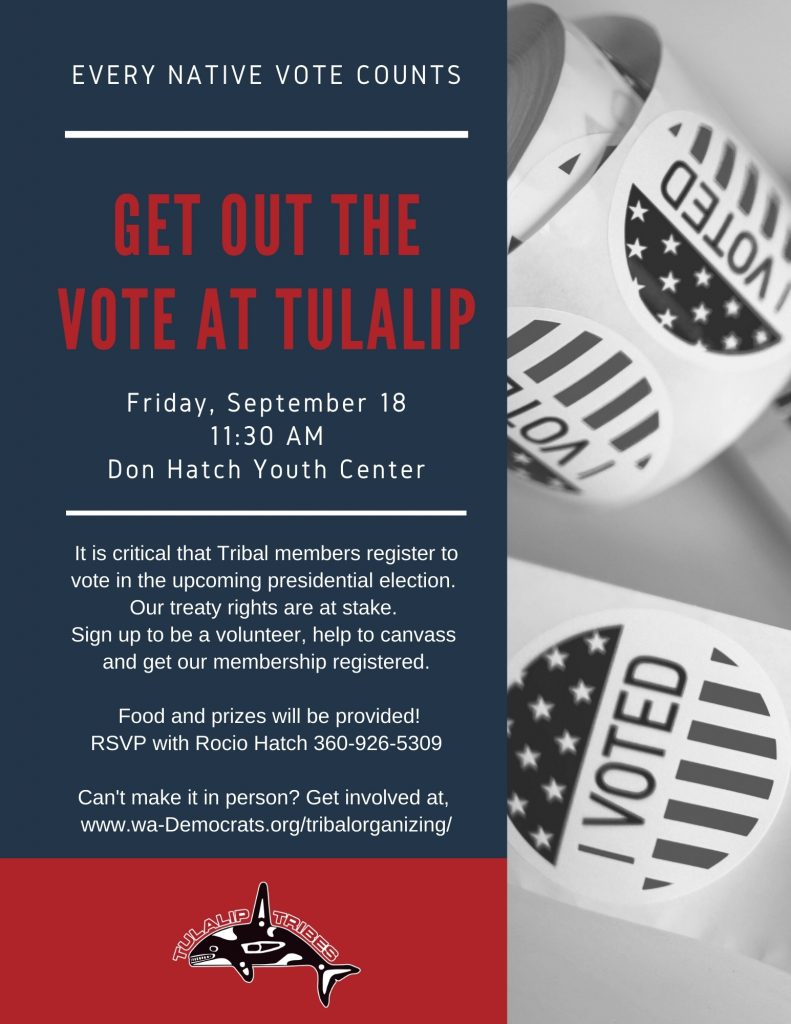
COVID cases in Tulalip are on the rise

syəcəb

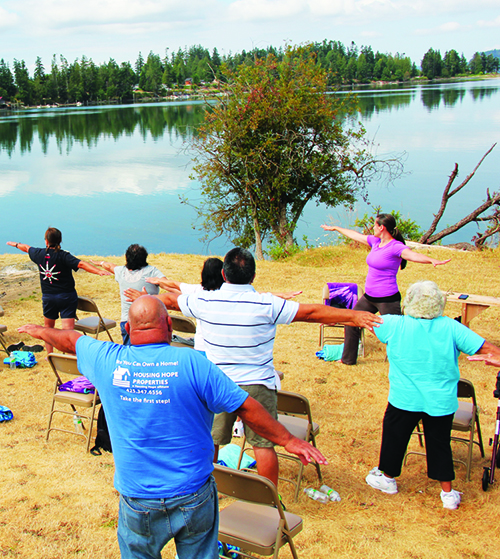
By Indian Country Echo; photos by Micheal Rios and Kalvin Valdillez, Tulalip News
In 2016, the Tulalip Diabetes Care and Prevention Program was awarded the Indian Health Service Portland Area Director’s Award for Excellence. Since then, the program has seen remarkable successes in treating patients and bringing the community together. In late March 2020, we had the pleasure of speaking with Veronica “Roni” Leahy- Diabetes Program Manager for Tulalip to learn more about their secrets to success.
Roni, who is a member of the Chiricahua Apache Tribe in New Mexico has worked in healthcare since the 1980s, explained to us that it was her father, who inspired her to work for tribal people. Since beginning at Tulalip, Roni has humbly viewed her role as someone who helps create spaces where community members can connect and feel that they are listened to and cared for by staff. She also sees it as her role to create a culture of care that is responsive to patients’ needs.
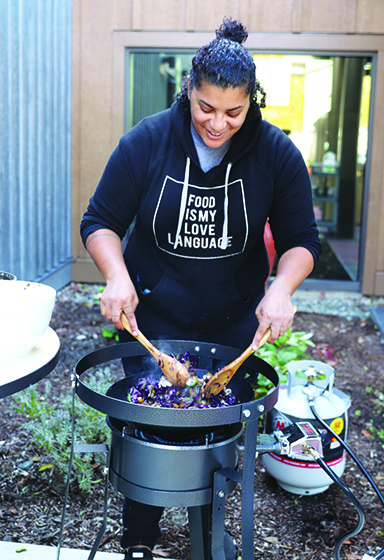
When Roni started in her position 12 years ago, the diabetes program was much smaller, consisting of only three full-time staff members. Shortly after, the Clinic’s leadership made sweeping changes that helped the program grow. Their first effort was to actively seek out and hire a dedicated Registered Nurse and Certified Diabetes Educator. Then, leadership put Tulalip’s Clinical pharmacists at the center of diabetes medication management by designating them as case managers. Additionally, through the diabetes team’s urging, the program and tribe began covering the costs for needed supplies and services for patients with diabetes, including medications, eye-exams, orthotics, physical therapy, chiropractic care, alternative medicine, dental care, and lab work not covered by insurance. Finally, the program began to expand outside of the clinic walls. With Special Diabetes Program for Indians (SDPI) funding, they created a wellness garden and trail and began to offer classes on herbal medicines, gardening, cooking, nutrition education, and wellness. Community members and their families began socializing, learning from one another and staff, and growing their toolbox of skills to take care of their health and the health of their loved ones.
Roni was delighted to see that when staff and community members interacted during diabetes program events real relationships and trust began to form. Roni believes that these relationships, as well as the program’s focus on engaging the whole community, have helped the program succeed.
Today, the Tulalip Diabetes Care and Prevention Program meets and, at times, exceeds the SDPI and IHS standards of care. It offers community member’s 1-on-1 support from diabetes case managers and the support of a coordinated care team of providers including – pharmacists, primary care doctors and advanced registered nurse practitioners, herbalist, acupuncturists, nurse educators, behavioral health specialists, optometrists, and podiatrists. It even has an Elder Advocate- a tribal member who is respected and valued as a spiritual person, who does home and hospital visits, oversees all program activities, and imbues program events with daily prayer and spiritual wellness. This person is Dale Jones, and he often will be heard saying “Every good thing starts with prayer and ends with prayer.”
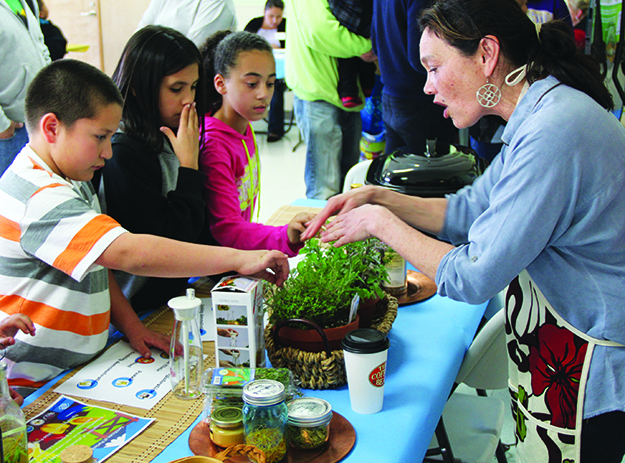
The program has seen remarkable success – a majority of patients with diabetes have an A1C of less than 8.0 as well as blood pressure readings of <140/<90, and almost all patients have received diabetes education. Roni credits the program’s successes to the vision of a committee of dedicated community elders who provide guidance. Through incorporating the wisdom of elders, staff work to implement consistent programming and regularly scheduled events, offer activities tailored for different age groups, and include as many community members as possible in growing the program. Finally, elders have encouraged Roni to develop a virtual walking journey that community members will take to the intended landing site of this year’s Canoe Journey. After receiving permission to make the journey to Snuneymuxw in British Columbia from the Snuneymuxw Chief and Council- Tulalip community members will join each other in counting their steps to “walk” the 340 miles.
Given the Tulalip Diabetes Care and Prevention Program’s commitment to building a culture of wellness, it is clear that their efforts will continue to take the Tulalip people far- one step at a time.
To Learn More about the Tulalip Diabetes Program please contact Veronica “Roni” Leahy at 360-716-5642 or at vleahy@tulaliptribes-nsn.gov
Please use the following link to download the September 19, 2020 issue of the syəcəb
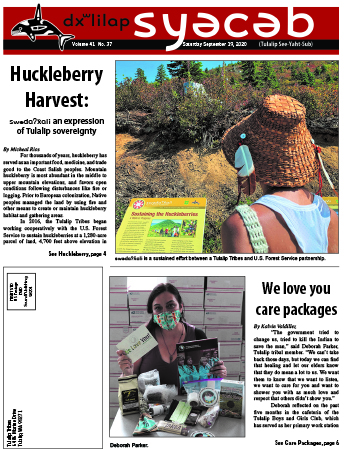
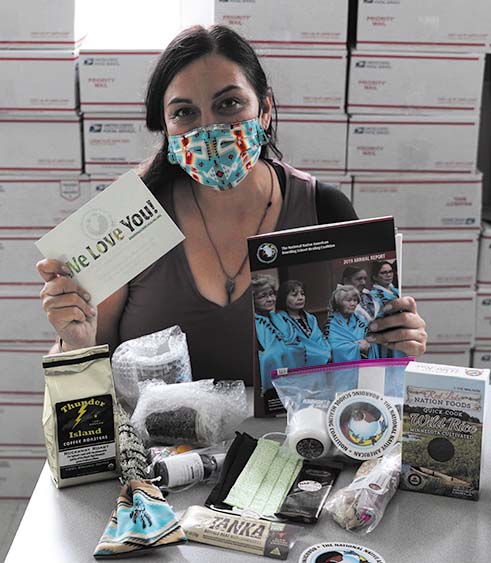
By Kalvin Valdillez, Tulalip News
“The government tried to change us, tried to kill the Indian to save the man,” said Deborah Parker, Tulalip tribal member. “We can’t take back those days, but today we can find that healing and let our elders know that they do mean a lot to us. We want them to know that we want to listen, we want to care for you and want to shower you with as much love and respect that others didn’t show you.”
Deborah reflected on the past five months in the cafeteria of the Tulalip Boys and Girls Club, which has served as her primary work station for the care package project. With a mountain of white USPS boxes behind her, she explained what one might expect upon opening one of the many boxes that were stacked neatly and nearly to the ceiling.
“1,000 boxes, that’s the ambitious goal,” she laughed. “We were trying to figure out what these boxes would be called and the words we came up with were just, ‘We Love You’. We want people to feel loved. Sometimes people go through life not knowing that someone loves them. The boarding schools made sure that our kids didn’t feel loved for who they were, who they are as Native Americans.”
Deborah of course needs no introduction, she is known nationwide for her work in Native America, using her voice for a number of causes, namely the Violence Against Women Act (VAWA). She was also handpicked to serve on the platform committee for Bernie Sanders during the 2016 Presidential Election. And just as important, Deborah has held a number of leadership positions locally for both the Tulalip Tribes and the Marysville School District. Her work extends beyond the US borders as well, working for the Tsleil-Waututh First Nation in Canada as the Director of the Residential Healing School early in her career, making her passion for providing healing for boarding and residential school survivors a lifetime commitment.
Last Fall, Deborah helped organize the 2nd Annual Boarding School Healing Conference at the Tulalip Resort Casino. The conference was hosted by NAB, or the National Native American Boarding School Healing Coalition, a non-profit founded in 2012 whose mission is to bring out the true history of boarding schools in America and residential schools in Canada, as it is often glossed over in textbooks, if mentioned at all.
“Our Native children were often put in schools and many never returned,” she explained. “We are currently fighting at the United Nations to bring back justice for the children and families who never returned home from the boarding schools.”
Assimilation brought on years of terror and abuse for Native children all across America. 367 boarding schools were established throughout the country in total, with 13 based in the state of Washington, including the Tulalip Indian School. The atrocities that occurred at the boarding schools in turn had a trickledown effect throughout the generations. Today, although several generations removed from the boarding school experience, the children, grandchildren and great-grandchildren of boarding school survivors are dealing with the aftereffects of the abuse that took place at the schools, trying to break the cycle of generational trauma that often appears as alcoholism and substance abuse, suicide, depression, poor diets, and domestic violence that stems from neglect, maltreatment and loss of identity caused by forced assimilation at the boarding schools.
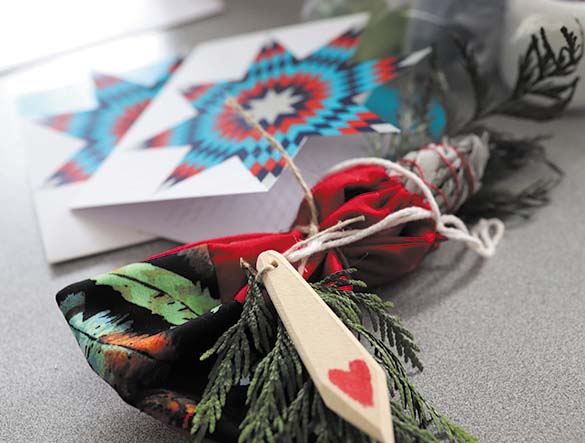
Although Deborah doesn’t have an official position with NAB, due to her personal connections and the desire to see residential school victims begin their healing process, she has been very involved with the non-profit’s recent activities, often volunteering to lend her voice, expertise and a helping hand whenever and wherever needed.
She said, “Back when COVID first hit, I asked who’s taking care of our elders? We just had a conference here at Tulalip and I met a lot of the elders and people who are just trying to process. I was concerned for them and their wellbeing. NAB had some funding that would’ve went to another conference, and since they didn’t spend the money, I started looking at products online for care packages. I started looking at how I could buy Indigenous.”
Taking it upon herself, Deborah began researching Native-owned businesses, compiling a wish list of products and companies she hoped to collaborate with. She reached out to these companies to gauge their interest in working together and their capability to fulfill large order requests during the coronavirus, many of whom were facing hard times as a result of the pandemic. In fact, many companies actually expressed that her business helped them immensely during this time of unknown.
“I realized that there are a lot of Native entrepreneurs and businesses that were really struggling, so I thought what a good partnership if we could send some of their beautiful items to the elders in need. This was a vision of creating a win-win situation between everyone involved, including NAB having the budget to support this effort.”

The next step, after purchasing products made by Indigenous creators from all across the country, was assembling the boxes. Knowing she could rely on her community, Deborah put out a call on Facebook and the volunteers showed up. Over the summer, community members of all ages leant a hand in putting together the care packages at the Boys & Girls Club, including Club members and staff.
“It’s been pretty fun, having the kids participate,” said Club Director, Mark Hatch. “Some of the basketball team kids come here and donate their time on the weekends and that’s pretty impressive. I think it’s really important work that Debbie and her team is doing.”
Tribal member Misty Flores and her kids have been volunteering their time to the care package project since the very beginning.
“We love working here,” Misty stated. “To be able to participate in this experience and help the elders is a once in a lifetime experience for us. In the last year I learned more about the boarding schools and what happened during those times. It’s really nice to be able to be a part of something so special and do something heartfelt for those people who had horrible things happen to them.”
Skylar Flores said, “It was a new exciting challenge to complete and it felt nice to help the elders who survived the boarding schools.”
Although she admits that curating each box requires more attention than she originally anticipated, Deborah expressed an extreme amount of gratitude for the volunteers and was beyond ecstatic when showcasing the contents of each box, noting that each package will be unique, as well as a surprise to the recipient.
“A lot of the products were harvested just for this and are sustainable,” Deborah said. “We have medicine bags that were handmade by Threads of Love, who went completely above and beyond to make every medicine bag special. The Native Wellness Institute sent us Native Wellness coloring books. We have the Three Sister seed-blend, from the Native American Agriculture Fund and the Flower Hill Institute. They sent us two cases of corn, beans and pumpkin seeds for elders to plant, and they also donated money to help us send the boxes out. The Native American Finance Officer Association, NAFOA, donated 1,000 chocolate bars that are from the Chickasaw Nation. It’s a really fine, delicious chocolate.”
She continued, “We purchased coffee from four different Native American Coffee Companies, so most of the boxes will have coffee. We have wild rice from Red Lake; Organic Huckleberry Jam by Rose’s Native Design from the Yakama Nation. From the Quinault Nation, Titus Capoeman and [Tootie James] made 1,000 Devil’s Club Salves and we have SovereigNDN Tea made by Jean Ramos. Amy Anderson (Tulalip) does the Salish Soaps. Puyallup donated 1,000 cedar roses, necklaces and beaded items. We have sweet grass lip balm, blackberry sage and sequoia candles. 1,000 paddle pendants handmade by a Chehalis tribal member and Cecily George painted hearts on each paddle.”
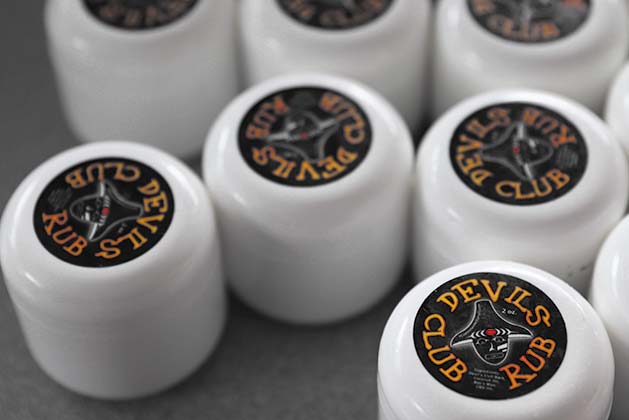
Deborah stated that although it was important to order locally, she also wanted to include items from as many sovereign nations that she could, including tribes based in Alaska, Oklahoma, Piute, South Dakota and New Mexico. Tulalip tribal member Sarah Hart, was called upon to add her contributions to the project. Sarah is known by the local community to carry sage and perform blessings and cleansings for people prior to gatherings and events. Sarah provided her potent, homemade hand sanitizer for the care packages, as well as sage that she journeyed to California to harvest.
“To know where the boxes are going touches your heart in such an unexplainable way,” Sarah said. “I have heard stories my whole life from elders, my grandma and family about boarding schools and the horror stories. To be a part of this is a real honor, to give them a little bit of medicine and remind them that we love them and without them, we wouldn’t be who we are today. They have sacrificed the ultimate pain and we owe them our prayers and love. It was emotional for me to have some of our youth [assemble care packages], including my son. Deborah explained, when the first boxes were made, what they were and what that meant. At the moment, everyone felt so much emotion in that room. To know my sanitizer and the medicine will go to a boarding school survivor is the ultimate honor.”
Deborah and her family also did a bit of harvesting of their own for this occasion, and out of their harvest they created a medicinal spray that helps ease tension and anxiety.
“One is sage, cedar, sweet orange and lavender, it’s called medicine bundle,” Deborah explained. “It took about a week of harvesting and distilling. We had Misty, her children, Colette from Northwest Indian College, and the [Boys & Girls Club’s] boys’ basketball team help with filling the bottles. We probably have about 600 bottles done. It took one whole day just to put the fluid in the bottles, cut the sticker and put them on the bottle and in a bag so they’re ready to go.”
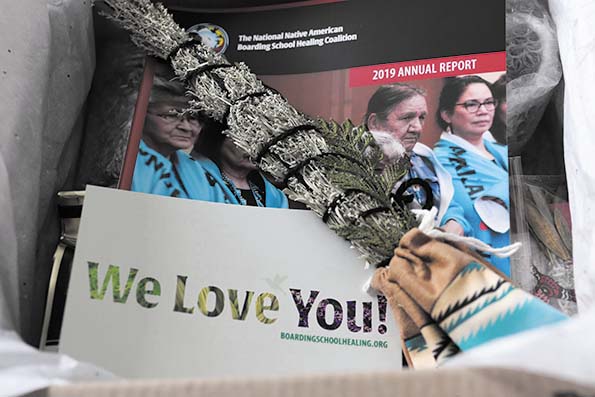
Although the grand total of care packages is 1,000, Deborah and the group of volunteers will be shipping out 150 boxes at a time. In addition to the items Deborah listed, the boxes may also include N95 or cloth masks, Red Corn Frybread dough, Eighth Generation socks, Native Wellness Life Magazines, and a We Love You card with instructions for the elders on how to share photos of their care packages on their social media, and additional information about the real history of boarding schools in North America.
“Starting this project was just a labor of love,” Deborah expressed. “It meant a lot to me for the elders to know that we care about them. Some of these ideas may seem off the wall like, ‘you’re just buying products, what does that have to do with Native people?’ It’s our survival, it’s our commerce, it’s how we take care of our elders. Because our families were separated, our children were removed, taking care of each other has been a challenge at times. We lost many of those skillsets that we once had, so getting back to the love, getting back to nurturing, getting back to community is one of our greatest needs in Indian Country.”
If you are looking to volunteer your time or are searching for my details, please contact Deborah Parker via Facebook or visit www.BoardingSchoolHealing.org
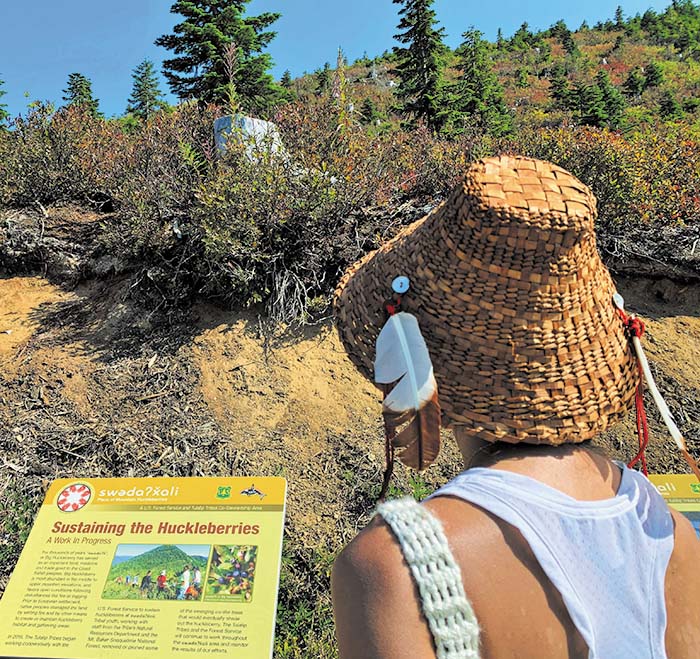
By Micheal Rios, Tulalip News
For thousands of years, huckleberry has served as an important food, medicine, and trade good to the Coast Salish peoples. Mountain huckleberry is most abundant in the middle to upper mountain elevations, and favors open conditions following disturbances like fire or logging. Prior to European colonization, Native peoples managed the land by using fire and other means to create or maintain huckleberry habitat and gathering areas.
In 2016, the Tulalip Tribes began working cooperatively with the U.S. Forest Service to sustain huckleberries at a 1,280-acre parcel of land, 4,700 feet above elevation in the upper Skykomish River watershed. This particular location is one of several co-stewardship areas throughout the Mt. Baker-Snoqualmie National Forest where Tulalip collaborates with the Forest Service to preserve and maintain important cultural resources.
Named swədaʔx̌ali, Lushootseed for ‘Place of Mountain Huckleberries’, this end of summer destination gives Tulalip tribal members an opportunity to walk in the shadows of their ancestors and harvest the highly prized mountain huckleberry. The gate to swədaʔx̌ali was officially opened on August 25 and will remain open through the end of September.
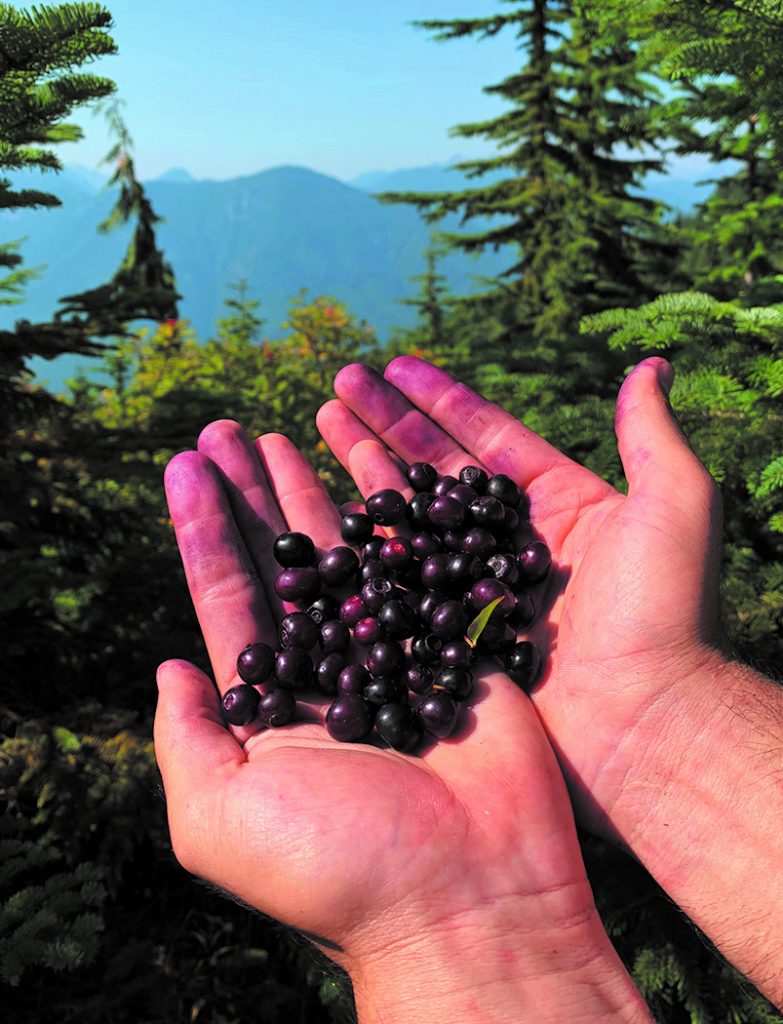
Northwest mountain huckleberries generally ripen in the late summer and can be picked into the early fall. Huckleberry, well-known for boosting the immune system and being rich in antioxidants, has always had a strong relationship to the area’s Indigenous cultures. Coast Salish tribes consider the huckleberry to be an important dietary staple because of its medicinal properties and sweet, delicious taste.
“Huckleberry is a food and medicine to our people,” explained Tulalip elder Inez Bill. “Our ancestors visited certain areas for gathering these berries. They knew where the berries were growing, what companion plants were growing there too, and how to use them.
“Through the teachings of how we value, take care of and utilize our environment, we pass down our history and traditions, and what is important to the cultural lifeways of our people,” she continued. “This connection to the land enables us to know who we are as a people. It is a remembrance. Today, it is not only important that we continue the struggle to uphold our treaty rights, but we need to be involved in taking care of those resources our culture depends on so they will be available to future generations.”
swədaʔx̌ali is a prime example of how Tulalip is diligently working to reclaim traditional areas. Stemming directly from the Point Elliot Treaty, which secured claims to gather roots and berries in all open and unclaimed land, the ‘Place of the Mountain Huckleberries” is an expression of Tulalip’s sovereignty.
Embracing that sovereignty is every tribal member who journeys to this ancestral harvesting area and practices their cultural traditions that continue to be passed on from one generation to the next. Tulalip mother-daughter duo, Malory Simpson and Tiyanna Bueno, have made the two-hour trek to harvest huckleberry twice so far, and plan on going once more before the gate is closed for the season.
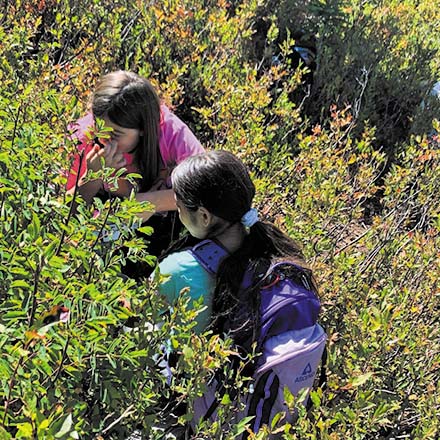
“I love being outdoors and harvesting. It is spiritually healing,” reflected Malory after collecting her berry bounty alongside her 9-year-old daughter. “It feels good knowing that my children are learning about our harvesting traditions with me. I want them to not only have a good understanding of how to harvest, but how to properly process what they’ve harvested, too.
“It’s important for our children to soak up teachings about how to harvest, process, and be self-sustaining in a good way,” the mother of three continued. “My plan for our harvest is to make some jam. We’ll be enjoying huckleberry pancakes and waffles as well. We’ll also be gifting some of our harvest for spiritual work.”
For the Tulalip Tribes, the mountain huckleberry is intimately tied with traditional lifeways and culture. Historically providing an end of summer harvest opportunity, the journey to swədaʔx̌ali strengthens a deep connection to the land as well. Nearly 5,000 feet up, in the Mt. Baker-Snoqualmie National Forest, berry pickers are completely immersed in the grand splendor that is the Pacific Northwest. Epic views of luscious, green-filled forestry, towering mountains, and clear waterways are purely mesmerizing.
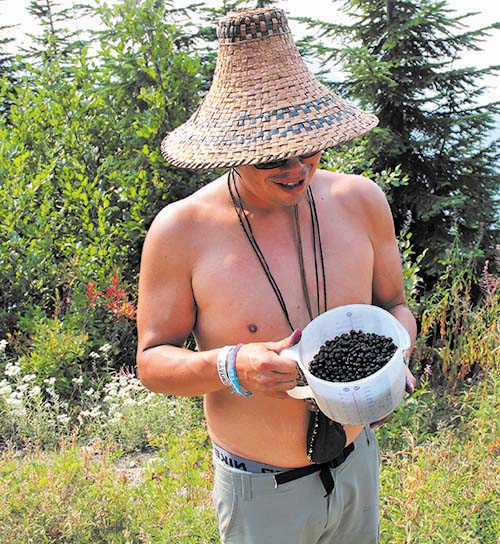
“It was a beautiful, uplifting experience. Once we hit the forest, where there were no buildings, no cars, no people, just trees…my spirit soared,” said Lushootseed teacher Maria Martin after staining her hands purple from a day of picking. “I’m fortunate to have the opportunity to speak my language, but that is only a piece of my culture. Berry picking feels natural, like I’ve always done it. The smells are intoxicating. The sounds are beautiful, from the buzzing bugs and chirping birds to the gentle breeze rustling the huckleberry leaves. These are the meaningful experiences that we all need to share in.”
Mountain huckleberry season is short, lasting only a few weeks between August and September. The sought after super food and medicine ranges in color from red to deep blue to maroon. They are similar to a blueberry and sweeter than a cranberry, with many people rating huckleberries as the tastiest of the berry bunch. The gate to swədaʔx̌ali will only remain opened for a couple more weeks, so don’t miss the opportunity to harvest, take in breathtaking views, and, most importantly, express tribal sovereignty.
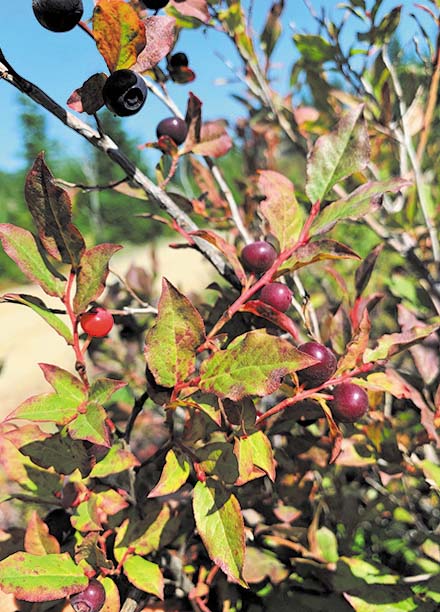
Huckleberry Health Benefits:

My name is Teri Gobin, and I’ve had the honor of being your Chairwoman since 2019. As Chairwoman, I have represented this tribe and defended our rights and interest at all government levels. I thank you all for the opportunity to continue that work.
All elections are important, but this Presidential election will decide what kind of Nation we will have for many years to come. Are we a nation of greed, distrust, and selfishness, of lies and division? Or, are we a nation that comes together at a challenging time and shows a united fight for equality, justice, and the next seven generations? Those are the questions before us today.
Donald Trump stands for weakening environmental protections like the Endangered Species Act, which helps us protect salmon vital to our culture, lifeways, and tribal economy. The Trump Administration has weakened water standards to allow more cancer-causing chemicals into our Salish Sea and our traditional foods.
Trump approved the Dakota Access and Keystone XL pipelines, which threaten the water supply and treaty and trust resources for tribes and ignores tribal sovereignty and government-to-government relationships. This administration also removed the Mashpee Wampanoag Reservation land, which has threatened the security of all tribes.
Additionally, Trump has cozy relationships with white supremacists and total disregard for the murders of BIPOC (black, indigenous, and people of color) at the hands of police. His ignorance of the problem of systemic racism in our society has disproportionately left BIPOC out of the American dream.
Since the beginning of time, our people have lived here. Our ancestors made great sacrifices to protect our tribal culture and lifeways. Joe Biden has a different vision for America, and it’s one where our values and our people are welcome.
Joe Biden authored the original Violence Against Women’s Act and in 2013 advocated for tribe’s rightful authority to protect native women through its reauthorization
As VP, Biden helped settle the Cobell settlement for $3.4 billion, creating the land buy-back program which restored millions of acres of land to tribal governments
The Affordable Healthcare Act helped provide health care coverage for over 110,000 Native Americans
As VP, the Obama administration made significant progress in strengthening the nation-to-nation relationship between the federal government and tribes and supported tribal sovereignty
Biden will immediately reinstate and make permanent the White House Council on Native American Affairs and the annual White House Tribal Nations Conference. He will also nominate and appoint people who look like the country they serve, including Native Americans.
Biden will make it a priority to restore tribal lands and protect the natural and cultural resources within them while honoring the role of tribal governments in protecting those resources. Joe will work to take land-into-trust and support tribal water rights.
On day one of the Biden Administration, he will issue executive orders to protect biodiversity, slow extinction rates, and leverage natural climate solutions by conserving 30% of America’s lands and waters by 2030. Biden will protect America’s natural treasures by permanently protecting the Arctic National Wildlife Refuge and other areas impacted by President Trump’s attack on federal lands and waters. Additionally, he plans to establish national parks and monuments that reflect America’s natural heritage. Including reversing President Trump’s proclamation on Bears Ears, which reduced two million acres of federally protected land at two national monuments in Utah.
As we look around at the smoky air, the diminishing salmon runs, and the loss of cultural places, we see that Indian Country and THIS country cannot afford four more years of Donald Trump’s corporate greed and divisive rhetoric. Let us set a new path toward healing the earth and ourselves.
For those of you who are not registered to vote, please do so now. It takes only a few minutes online. Indian country counts, your voice counts!
Go to www.vote.org/ OR votewa.gov
It is so important to vote. Our future depends on it.

Please use the following link to download the September 12, 2020 issue of the syəcəb
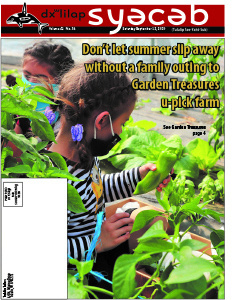
JUNE 14, 1931 – SEPTEMBER 4, 2020
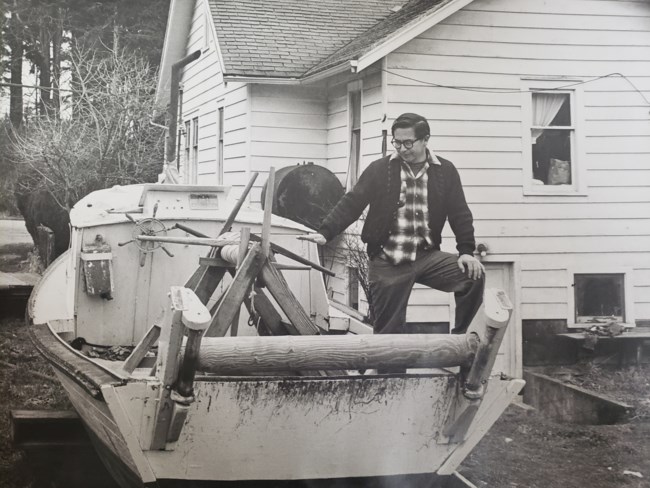
Clyde Williams was a member of the Tulalip Tribes and the son of Lawrence and Christina Williams. He served in the United States Army in the 1950s, and was stationed in Germany where he was chosen to play on the Army baseball team, the Flaks. Clyde was an excellent baseball player and a great pitcher. (He had an arsenal of nine pitches!) He was drafted into Major League Baseball by the Philadelphia Phillies, requiring him to go straight to training camp after being discharged from his service in the army. Ultimately, he decided not to join the Phillies and so returned home to his family. Clyde was a fisherman by trade as well as a self taught master carver, with many of his carvings still displayed in the Tulalip Casino, Hotel, and Health Clinic. Clyde is survived by his beloved wife of 63 years, Maxine Williams, three sons; Clyde Jr., (Monica), Alan (Arnel), and Gene Sr. (Julie), along with 13 grandchildren; Alicia, Tatiana, Christina, Alan, Bruce, Tiffany, Dane, Jason, Casey, Gene Jr., Evan, Brandon, Tanessa, and honorary grandson, Art. Clyde is also remembered by 25 great grandchildren whom he loved dearly and enjoyed their company always. He is also survived by his brothers Herman and Arley Williams, several nieces, nephews and cousins. He was preceded in death by his mother and father, Christina and Lawrence Williams, sisters Jane Wright and Dorraine Jones, his grandfather, Andrew Fryberg and grandmother, Louise, and great grandmother, Elizabeth “Kiya”.
Graveside service will be held Friday, September 11, 2020 at 11:00 AM at Mission Beach Cemetery.
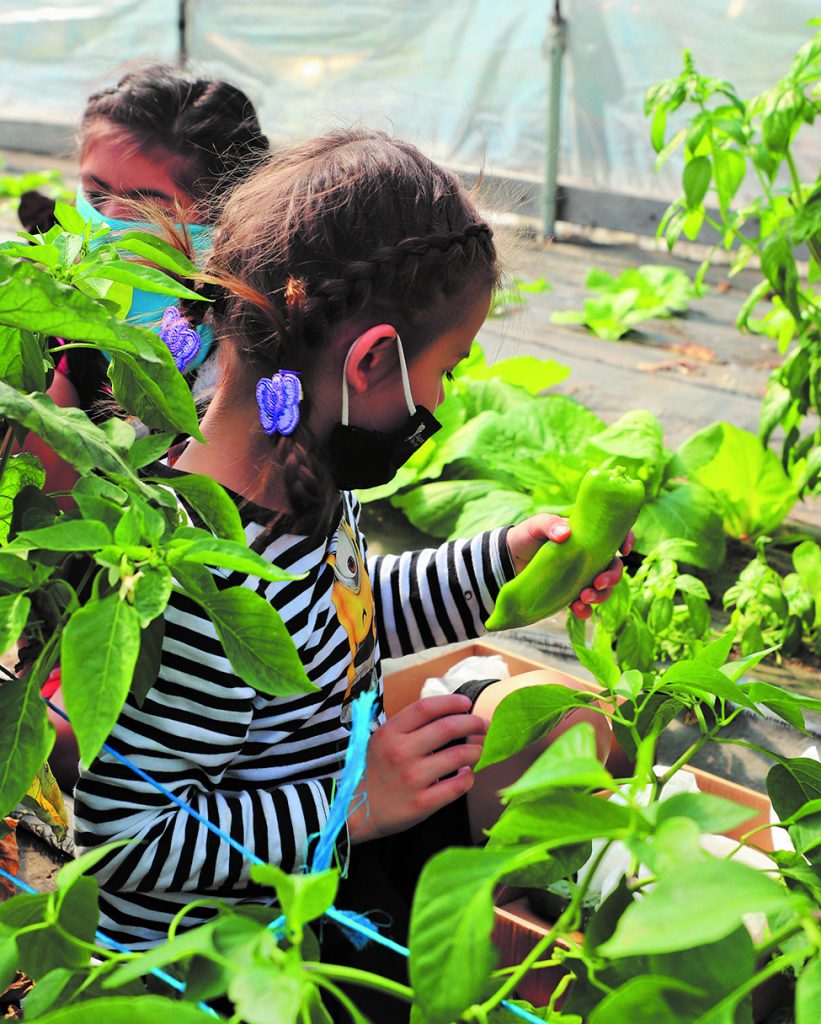
By Micheal Rios, Tulalip News
Have you been desperately wanting to have a family outing before summer is over, but haven’t found the opportunity to do so yet? There’s still time to make it happen and an ideal destination is an organic u-pick farm located just over 20 minutes from the heart of Tulalip. Conveniently located off exit 208, Garden Treasures is an everyday, local farm stand, farmers market and garden center.
Going out to a farm to pick your own produce gives children a sense of where food comes from, demonstrates the satisfaction of seeing how seeds grow into fresh produce that nourish your body, provides a great opportunity to get some fresh air and sunshine while social distancing, and it’s just a fun way to spend a summer day together as a family.
“I really enjoy having elders and kids visit the farm,” said elder advocate Dale Jones. “They have big smiles on their faces while enjoying the opportunity to be out in the farm and eat the fresh foods. Our elders are happy to visit with each other again and sit and work with the plants or watch us make tea and lavender bundles. The kids can see how the food grows and they learn how it is better for them than fast food and candy.”
Spending time outdoors while wandering the vast fields and green houses at Garden Treasurers is the perfect opportunity to get back to nature, both physically and spiritually. Their seasonal u-pick garden is full of berries, vegetables and an assortment of flowers. They don’t use any synthetic chemicals or fertilizers, so your u-pick experience is safe, clean, and natural.
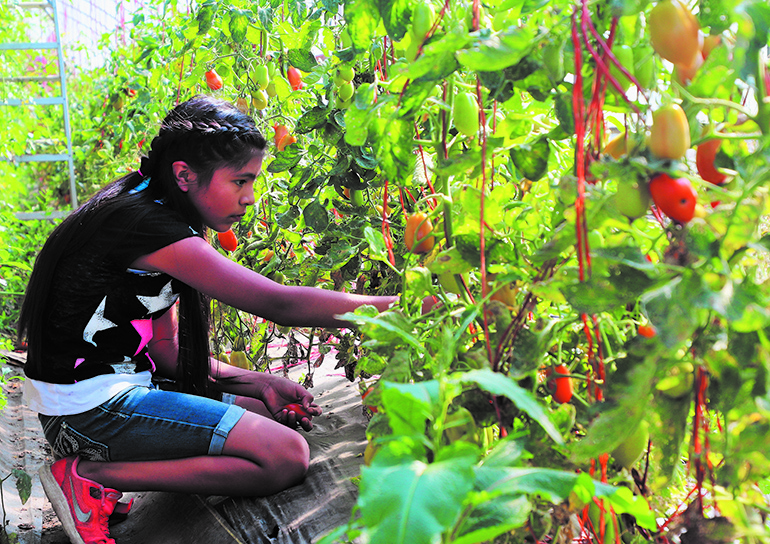
All Tulalip tribal members, their families, and any patients of the Tulalip Health Clinic are encouraged to take full advantage of a unique partnership between Garden Treasures and Tulalip’s own Diabetes Care and Prevention Program. From 9am to 5pm on Wednesday, September 16th and 30th, those listed above can visit the farm, enjoy a healthy bite to eat, and get a tour by Diabetes Care staff. Most importantly, every Tulalip household is allowed to pick up to $30 worth of nutritious produce from the garden.
Unlike overly priced grocery stores and organic shops, $30 worth of fruits and vegetables at Garden Treasures goes a long way. You can easily pick an assortment of sweet and spicy peppers, cucumbers, tomatoes, squash, eggplant, zucchini, strawberries, huckleberries, edible flowers, carrots, celery, and some herbs with the $30 credit. Numerous Tulalip individuals and families have done just that, and for many it was their first time ever picking veggies.
Donna and Jim Furchert brought their daughters, Joy and Patience, to Garden Treasures and came away with quite the colorful harvest. “We’ve never picked fresh fruit or fresh veggies before, so I wanted us to experience this as a family,” explained Donna. “We’re going to incorporate everything we picked into our dinners over the next few days.”
Six-year-old Patience said she liked digging for carrots and peppers the most and was super excited to stumble upon the strawberry patch. Of all the foods though, she was seen devouring cherry tomatoes straight off the vine at every opportunity.
Catrina Cultee was another first timer to the local, organic farm. She brought her 5-year-old daughter, Nevaeh, and niece Manaia. “It’s out first time out here and we absolutely love it!” marveled Catrina while perusing the fields. “Never knew we had a u-pick farm this close to the reservation. This seems like the perfect way to get fresh vegetables and fruit. It’s a way to get the young ones excited to eat more vegetables, too, because they can pick them themselves.”
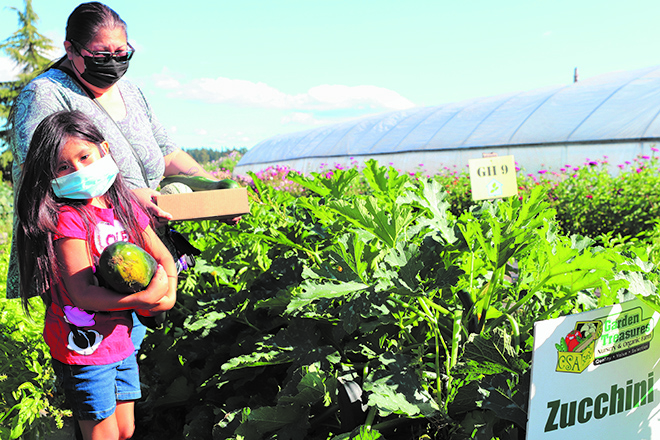
When 14-year-old Manaia came across the greenhouse full of sweet, spicy and Pablano peppers she was instantly in heaven. Turns out the teenager loves spicy food and got some ambitious ideas while picking to her heart’s desire.
“I definitely want to make a sauce from the tomatoes and peppers,” beamed Manaia with two handfuls of peppers. “I love spicy food! I’m looking forward to making burritos with all these veggies, some meat, and peppers, of course. Being out here, all the different flowers, seeing sunflowers taller than me, is so cool. The giant zucchini is crazy. I didn’t know what it was at first because I’ve never seen a vegetable like that before.”
For Tulalip citizens desiring to eat healthier and want to add a variety of vitamins and nutrients to their everyday meals that will naturally boost immune systems, fruits and vegetables is the answer. People who eat more fruits and vegetables as part of an overall healthy diet are likely to have reduced risk of chronic diseases. Plus, eating fresh produce is vital for health and preventative maintenance that will make you just feel better and have more energy.
In addition to all the health benefits is the wisdom and positive encouragement the Diabetes Care and Prevention Program staff have to offer while visiting the farm on September 16th and 30th. They will be there to answer all questions about the nutritious foods and offer advice about healthy meal making and dietary requirements for those managing diabetes.
“I am getting to an age in life when it’s important to pass down knowledge and share my gifting with others, especially the younger generation,” explained Roni Leahy, Diabetes Program coordinator. “I love being with all the people and listening to them talk about their experiences in the garden or the kids discovering how the plants they eat grow. It is such a precious opportunity to talk about the plants and how important they are in health of our bodies. This truly is prevention of diabetes and other chronic diseases.”
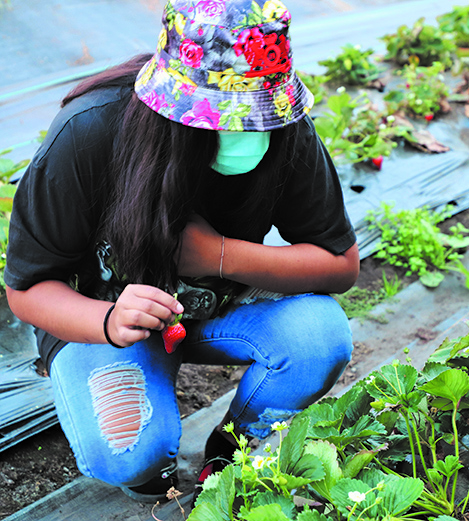
“My favorite part is seeing the community members and their families out at the farm enjoying the vegetables and knowing they are going to go home and prepare a meal they will all remember and enjoy,” added Brooke Morrison, Diabetes Program assistant.
Visiting Gardening Treasures u-pick farm to harvest the freshest foods will boost your health without creating a dent in your wallet. Bringing the kids can only help them create a lasting relationship with nature and plant seeds of curiosity and excitement for eating a variety of vegetables. Maybe even, this will be the inspiration your family needs to plant a garden at home.
“I couldn’t believe how big their fields are and how many different kind of vegetables they offer. It was really, really nice being able to pick whatever I wanted,” said Tulalip elder Virginia Carpenter. “I haven’t picked strawberries since I was a teenager, some 70 years ago.
“I’d tell anyone in Tulalip, whether an elder, youth or anything in between, the trip to this farm is worth it and you’ll really enjoy it,” she added. “To walk around outside and be around all the fresh flowers and see all their goods, it really puts your mind at ease and makes you feel better with everything else going on in the world right now.”
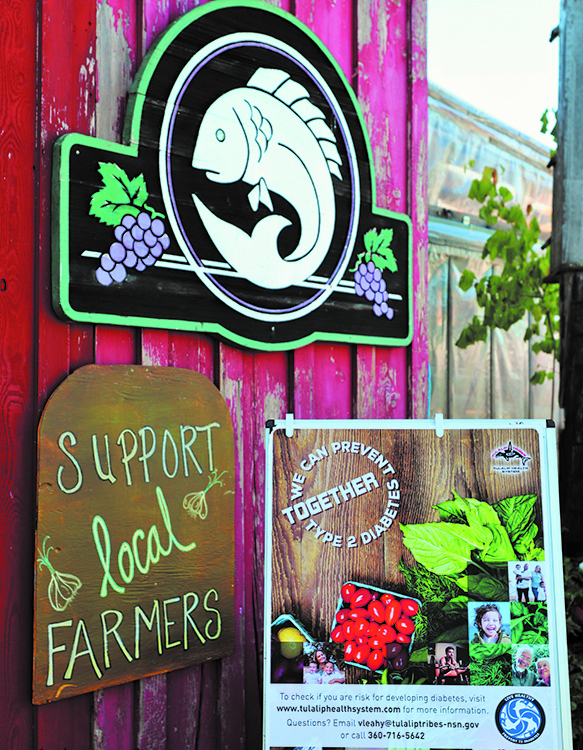
For more information about the two upcoming Garden Treasures community days brought to you by the Tulalip Health Clinic’s Diabetes Care and Prevention Program, please call 360-716-5642.
The coming weeks are the perfect time to still find ripe strawberries and garden-fresh produce at your local, organic u-pick farm. Spending time outdoors, the most natural form of social distancing, beats waiting in line at the grocery store and will help support your local farmers.
